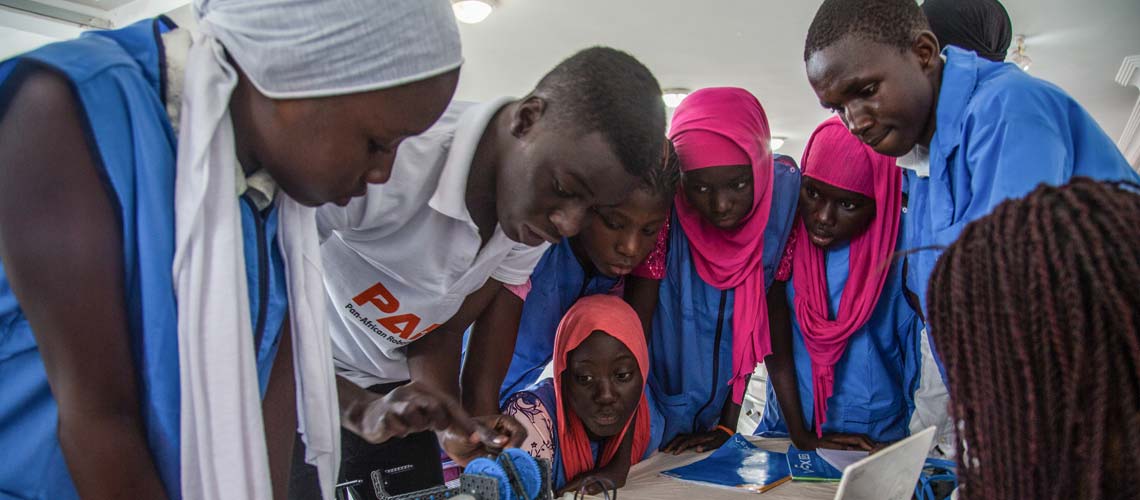 Students working on a robotics competition.
Students working on a robotics competition.
Four months ago, I had the opportunity to sit down with women scientists and leaders in their fields of expertise. It was within the framework of a conference organized to sensitize young girls to take an interest in science-based courses. Each of these women had the time to tell their story as a woman committed to the promotion of “Science, Technology, Engineering, and Mathematics” (STEM). They all came to the same conclusion: Africa in general, and Burundi in particular, needs more women scientists in the process of sustainable development for their country, and in the maintenance of peace. In Burundi, only 17% of the workforce in STEM represents the share of the fairer sex.
When I first realized at a young age that girls were not encouraged to follow their passions and talents in STEM fields, I decided to help change that. After obtaining my baccalaureate in math and physics, I turned to the civil engineering sector. Currently, I am part of associations engaged in promoting talent and developing business opportunities for women in science and engineering. I have learned a thing or two about what works when it comes to making sure the next generation of girls and women feel interested in joining STEM.
- Self-esteem is paramount
When I was still a student in high school, I used to write almost every day a little word on the corner of the blackboard, a "lucky phrase" heard among adults or read in the newspapers, to boost my classmates. “Humility precedes glory” – “Appetite comes with eating” – “Education is the key to development”. It was, moreover, my way of making the voice of the shy girl that I was heard, without overdoing it. I am speaking to a young girl who reads this blog and who, one day, dreams of getting ahead. Can I make a suggestion to you? Get up and speak! Dare to speak! …of what touches you, of what you see, of the things you hear.
I realize today, many years later, that the seed sown in high school has certainly allowed me to more easily embrace a sector in STEM, which sometimes requires being able to assert myself in a sector mainly composed of men and boys. Support for young girls, their training, and their full ability to make their ideas heard are levers for success in their future careers.
- Young women need relevant role models
Today, the girl who wrote on the blackboard in high school has become a university teacher and runs a construction company. Until the end of the 18th century, women and girls were only busy with domestic work and household chores. Today, the number of working women is increasing dramatically, from around 40% in the mid-1940s to almost 70% worldwide. However, according to World Bank data, only 1% of Burundian women working today have a job in the industrial sector, and the share of men in this sector is 6%.
Girls might not believe they can turn their interest in STEM subjects into a career if they only see men in these fields. I invite those of us who work in it to show that science is not a gender affair, and that some women have already contributed in a significant way, throughout history despite the obstacles. Yes! You can!
- Give a taste of science and technology from an early age
It is true that the titles “engineer” or “doctor of nanotechnology” are terms that can seem intimidating, even for parents. And yet, children are born scientists: they are curious, observe, experiment with the world around them and ask themselves many questions. To cultivate the curiosity of our children, we should create in our schools a program of initiation and awareness of science with free online resources, books of activities to do, both at home and in the classroom. By participating in hands-on and fun engineering and technology activities, from an early age, girls and boys (and their parents) can better understand what they could do as an engineer or doctor of nanotechnology.
STEM has been there in the past, is here today, and will be here in the future and to keep the momentum going, we need boys and girls to pursue STEM education and careers, which will enable Burundi to close the jobs gap and build a stronger economy.


Join the Conversation